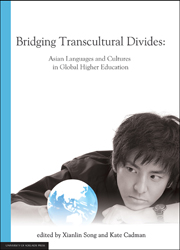Book contents
- Frontmatter
- Contents
- Acknowledgements
- List of Contributors
- Foreword
- Part I Another pedagogy is possible
- 1 Embracing transcultural pedagogy: An epistemological perspective
- Part II Re-locating teaching and learning
- Part III Transforming curriculum in Asian language teaching
- Part IV Capitalising on Asian social and cultural studies in contexts of diversity
- Part V Bridging learning gaps
1 - Embracing transcultural pedagogy: An epistemological perspective
from Part I - Another pedagogy is possible
Published online by Cambridge University Press: 05 June 2013
- Frontmatter
- Contents
- Acknowledgements
- List of Contributors
- Foreword
- Part I Another pedagogy is possible
- 1 Embracing transcultural pedagogy: An epistemological perspective
- Part II Re-locating teaching and learning
- Part III Transforming curriculum in Asian language teaching
- Part IV Capitalising on Asian social and cultural studies in contexts of diversity
- Part V Bridging learning gaps
Summary
Father and Mother, and Me,
…
And all good people say,
That all nice people like us are We,
And everyone else is They:
But if you cross over the sea,
Instead of just over the way,
You may end by (think of it!) looking on We
As only a sort of They!
— Rudyard Kipling, We and they, 1926.Introduction
‘We’ are the good people who research and teach in a typical research-intensive Australian university; ‘they’ are the diverse, multi-ethnic students we are now, literally, in the business of educating. And in our specifically Asian Studies context, we are particularly interested to know how these students interpret their educational achievement, so, at the end of their courses, we ask them to describe what they have learned. One Chinese-background student who was at the end of his undergraduate degree program, wrote curtly in a shaky hand: ‘Multiculturalism is a big fat lie’. In such a comment it seemed to us this student was expressing what they, and many of their colleagues, had personally experienced as the failure of the Australian education process to provide them with learning experience that was equitable, relevant and satisfying for them. In so many cases, the internationalising of higher education in Anglo-Celtic countries such as Australia has quite simply not been able to produce the kinds of teaching that are demanded when international, largely Asian, students enter existing degree programs in large numbers.
- Type
- Chapter
- Information
- Bridging Transcultural DividesAsian Languages and Cultures in Global Higher Education, pp. 3 - 26Publisher: The University of Adelaide PressPrint publication year: 2012
- 6
- Cited by

